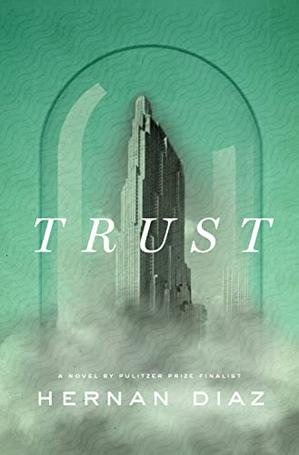First, two works of fiction, both about financiers:
Trust Hernan Diaz (2022) Diaz explores the trustworthiness of narrative through four different takes on the same story, about a fictional early-twentieth-century Wall Street financier. First, a novella captures the style of Edith Wharton, then an unfinished autobiography reveals its author’s vanity and arrogance. A memoir by the autobiography’s ghost writer gives another perspective, and finally the diary of the financier’s wife provides a new twist to the tale. Diaz navigates these disparate genres with stylistic ease, as he asks, Whom do you trust to tell you the truth?
The Magnolia Palace Fiona Davis (2022) I reviewed Davis’s 2016 novel, The Dollhouse, on this blog in 2017, and The Magnolia Palace is the fifth novel that Davis has churned out since then. Her signature formula includes an actual iconic building in New York City as the setting and two fictional young women, living decades apart, who are involved in a complicated mystery. The Magnolia Palace is a lightweight, entertaining romp, set in the Frick Collection, a fine art museum that was formerly the home of Henry Clay Frick’s family. The two women are models, one in 1919 and one in 1966. Brush up on your art history!
Next, two collections of essays:
These Precious Days Ann Patchett (2022) Patchett provides plenty of insights into her family background and her fiction-writing process in these essays. (See my reviews of her novels Commonwealth and The Dutch House.) The title piece, and the longest, starts with Patchett reading Tom Hanks’s short story collection, Uncommon Type. She admires the book (as did I; see my review) and, through a series of coincidences, gets to know the actor and his assistant, Sooki Raphael. Sooki ends up as a long-term houseguest of Patchett and her husband at the beginning of the pandemic. Patchett writes a moving account of their unexpected and rewarding friendship.
Happy-Go-Lucky David Sedaris (2022) For fans of David Sedaris (count me in), every new collection of his essays means a couple of evenings of sure-fire good reading, unveiling the vagaries of family relationships. (See my previous commentary on his body of work.) Happy-Go-Lucky focuses quite a bit on the last years of David’s nonagenarian father, Lou, and on the impact of the COVID pandemic. The stories are honest, touching, sometimes heartbreaking, sometimes disturbing. There is simply no other essayist who is as irreverent and candid and downright funny as David Sedaris.





